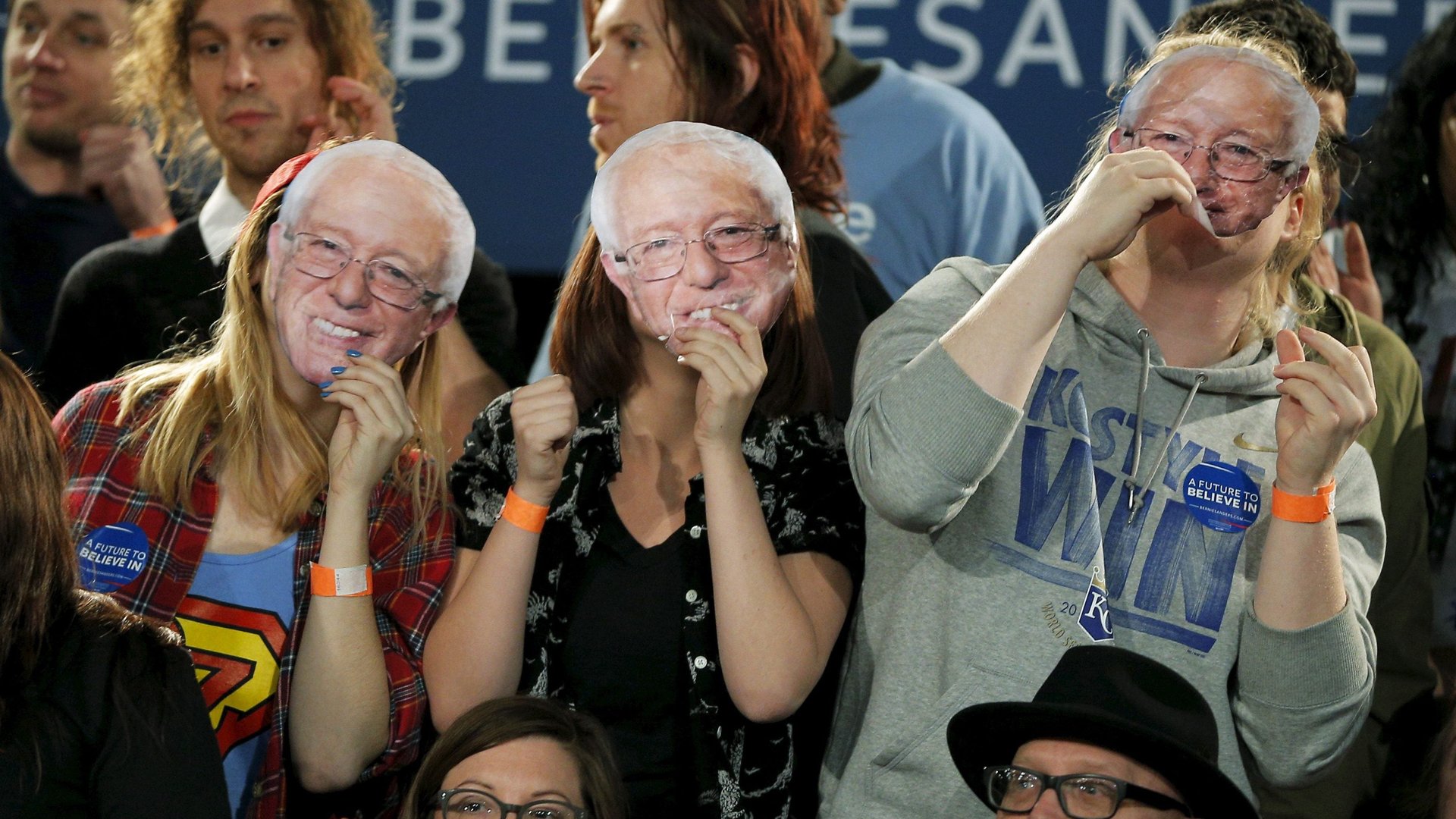Bernie Sanders fights a sea of (better) Bernies for 2020
Bernie Sanders, the independent Vermont senator, officially joined the 2020 presidential race with a direct attack on Donald Trump.


Bernie Sanders, the independent Vermont senator, officially joined the 2020 presidential race with a direct attack on Donald Trump.
The US president is a “pathological liar,” Sanders told Vermont Public Radio while announcing his candidacy today (Feb.19) , as well as a “racist, a sexist, a homophobe, a xenophobe.”
His entry into the Democratic race set the stage for a newly pugilistic presidential race, just as Sanders 2016 campaign appears to have shaped the 2020 platform of many of his Democratic competitors. They are almost uniformly running on his 2016 promises of expanded healthcare, lower-cost college, fixing wealth inequality in America, and reforming the country’s cash-soaked elections that give the wealthy disproportionate influence at the polls. Most, however, have aimed to talk up their candidacies without taking direct aim at Trump.
Even Trump’s 2020 campaign seems to agree, and declared Sanders the winner of the Democratic primary today:
Bernie Sanders has already won the debate in the Democrat primary, because every candidate is embracing his brand of socialism. But the American people will reject an agenda of sky-high tax rates, government-run health care and coddling dictators like those in Venezuela. Only President Trump will keep America free, prosperous and safe.
To actually win the Democratic nomination, Sanders faces rivals who may be embracing his positions, but who don’t have the same baggage that weighed down the 77-year-old avowed socialist in 2016.
In his announcement, Sanders highlighted his impact on the US political landscape. “Together, you and I and our 2016 campaign began the political revolution,” he said. “Now, it is time to complete that revolution.”
This time, Sanders is competing against a bunch of improved versions of himself.
Here is a look at those who may resemble him most. May the best Bernie win.
Elizabeth Warren, aka “The thinking person’s Bernie”
Warren, the Massachusetts senator, has well-thought-out policy positions backed by economic analysis and a track record of getting things done in Washington that Sanders doesn’t, despite his decades in Congress. Sanders’ 2016 campaign was derailed in part by a disastrous interview with the New York Daily News, in which he struggled to explain how he’d break up big banks or prosecute Wall Street CEOs, two of his signature promises. The interview demonstrated Sanders is “a passionate, intelligent man who has no clue how to run the country,” one critic wrote afterward.
Kamala Harris, aka “The intersectional Bernie”
Sanders’ 2016 campaign ignored people of color, and it showed at the polls, where he lost black voters by big margins. He didn’t help the situation with a November 2018 interview in which he excused white voters who were uncomfortable voting for an African-American candidate as “not necessarily racist.”
Harris, whose Indian/Caribbean heritage would make her the first woman of color to be nominated for president, already has huge support among Democratic women of color, one of the party’s most important voting blocs.
Pete Buttigieg, aka “The millennial, gay Bernie”
The Indiana mayor and military veteran, 37, is highlighting the very same drop in US middle-class prosperity that Sanders has. But Buttigieg may be more convincing in speaking about the effects, because it’s his generation ‘s livelihoods that are on the line. “We have got to change the trajectory that we’re on so that mine is not the first generation to be worse off economically than my parents’ was,” he told NPR.
Like many politicians in their 70s, Sanders’ support of gay marriage has “evolved;” he wasn’t as vocal as many progressive voters would like during the 1990s. Buttigieg is the first openly gay man to run for president.
Kirsten Gillibrand, aka “The #MeToo Bernie”
The New York senator, who has a more conservative history than Sanders, is pushing “fair wages” and backing the Denver teacher’s strike. She’s distinguished herself in Congress by being a strong voice against sexual harassment; even before the #MeToo movement, she invited an activist on college sexual assault to be her guest at the State of the Union and introduced bills to protect women in the military.
In contrast, former Sanders staffers have described a “dangerous” level of sexual harassment within the campaign, and some of his Bernie Bro followers threatened female critics.
Beto O’Rourke, aka “The younger, more charismatic, Spanish-speaking Bernie”
O’Rourke, 46, inspired similar levels of enthusiasm in his 2018 Texas senate race that Sanders did in 2016, drawing in nearly $40 million in donations from around the country in one quarter and pulling non-voters off of their couches. He, too, lost.
O’Rourke’s highly anticipated entry into the 2020 race already has Sanders’ staunchest supporters attacking him. His Texas border region upbringing and familiarity with Latino culture are in marked contrast to Sanders’ deep roots in one of the whitest states in the nation.
Amy Klobuchar, aka “The more moderate Bernie”
The Minnesota senator has a solidly liberal track record, one that in other election cycles would put her to the left of the political spectrum, as the Minnesota Post notes. Thanks in part to Sanders’ influence, she’s now seen as a moderate in the party—she hasn’t embraced single-payer health insurance, she isn’t seeking to abolish the Immigration and Customs Enforcement (ICE) agency.
That could put her in a position to pick up Republicans disenchanted with Trump, but who would never pull the lever for a socialist like Sanders.